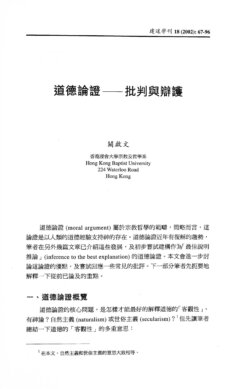道德論證──批判與辯護/關啟文
撮要
道德論證認為,我們的道德經驗能為神的存在提供支持,本文會勾劃道德論證的輪廓,並為它提出幾個支持的論點。第一,我們深刻的道德經驗(如良心的呼喚、罪咎感等)與有神論更融貫,而與自然主義不大吻合。第二,神本倫理以神人關係為中心,並非律法主義。第三,神本倫理能避免事實與價值的分割。第四,有神論世界觀和神本倫理有廣泛的說明能力,優於它的對手。文章接著列舉對道德論證常見的十四種批評,並逐一回應。最後的結論是:道德論證雖然不是決定性的證明,但它可成為支持神存在的累積論證的重要部分。
ABSTRACT
The moral argument purports to show that the evidence from our moral experience supports the existence of God. The article first outlines the moral argument and then adduces several reasons for the plausibility of this argument. First, our vivid moral experience of conscience, guilt, etc. is more consonant with theism than with naturalism. Second, the centrality of the divine-human relationship in theistic ethics or divine command ethics shows that theistic ethics is not of legalism. Third, theistic ethics can avoid the dichotomy of fact and value. Fourth, theistic worldview and ethics shows its comprehensiveness and explanatory power, which is lacking in other prominent alternatives. The author then defends theistic ethics against fourteen common criticisms. Finally, the author concludes that although the moral argument is by no means a conclusive one, it is a significant part of a cumulative case for the existence of God.
原載於《建道學刊》18期(2002年7月),頁67-96。







